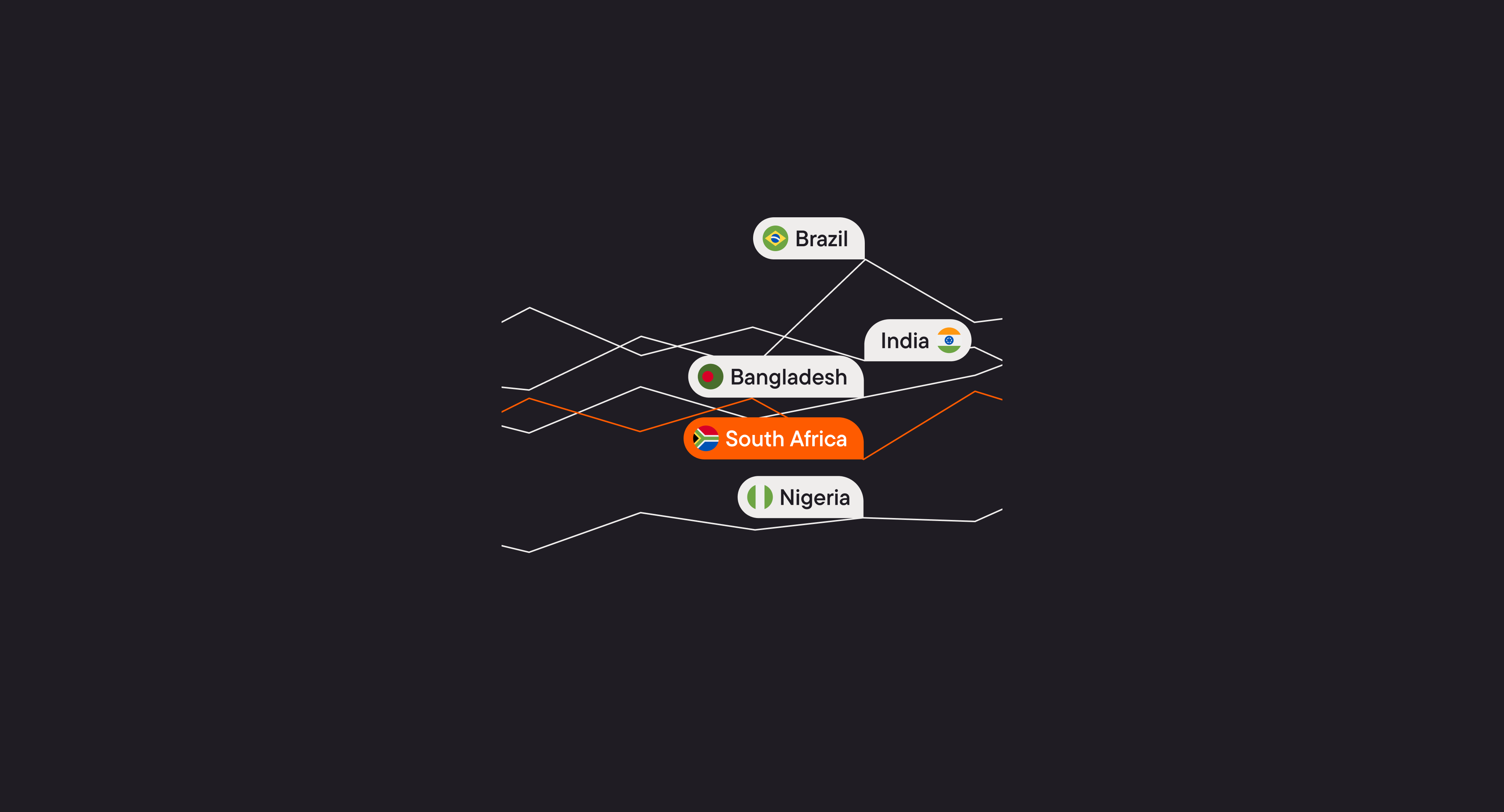In the fast-paced world of iGaming, staying competitive isn't just a challenge—it's a race. Whether you're an established giant or a new player in the market, understanding the intricacies of iGaming markets is crucial. But let's be real: manually analyzing market data, tracking competitors, and predicting trends can feel like trying to solve a Rubik's cube blindfolded.
Enter AI tools—your new best friend in this race. With AI, comparing iGaming markets and staying ahead of the competition is no longer just a dream; it's your reality. And guess what? We're here to help you make that reality a whole lot easier.
The challenge of staying competitive in the iGaming industry.
The iGaming industry is a dynamic and rapidly evolving space. Every day, new regulations emerge, player preferences shift, and technology advances. In such a landscape, standing still is not an option. To thrive, you need to constantly adapt, innovate, and most importantly—outsmart the competition.
But here’s the kicker: staying ahead requires more than just knowing your market. You need to understand your competitors, track emerging trends, and anticipate changes before they happen. That’s a lot to juggle. Fortunately, AI has stepped in to make this complex process more manageable. By leveraging AI tools, you can simplify market comparisons and make informed decisions faster than ever before.
But before we get into how AI can help, let’s take a closer look at the specific challenges iGaming companies face today.
Regulatory complexities.
Navigating the complex and ever-changing regulatory landscape is one of the most significant challenges faced by iGaming operators. Each country has its own set of laws and regulations, making it difficult for companies to operate uniformly across different regions. For instance, while Europe remains one of the largest iGaming markets, each EU member state has unique laws that require careful navigation. In the U.S., only a handful of states have legalized iGaming, creating a fragmented market that companies must carefully maneuver through. Staying compliant while expanding into new markets is not just a necessity—it's a challenge that can significantly impact an operator’s bottom line.
High competition and market saturation.
The iGaming industry is characterized by fierce competition and rapid expansion, with new operators constantly entering the market. Understanding one's current position is crucial for progress in this dynamic environment. While established giants like bet365, Betano, and Stake dominate significant market shares, there's still room for innovation and growth.
To stay relevant, companies must continuously innovate and adapt to evolving player preferences. This is evident in the relentless pace of content creation, with leading providers releasing new titles or expanding into new markets almost weekly. In a saturated market, offering fresh and engaging experiences can be the key differentiator between industry leaders and those falling behind.
Blask enables iGaming companies to easily compare countries and markets through its comprehensive data and analytics platform. With Blask, users can access real-time market share data, track competitor performance, and analyze industry trends across multiple countries simultaneously.
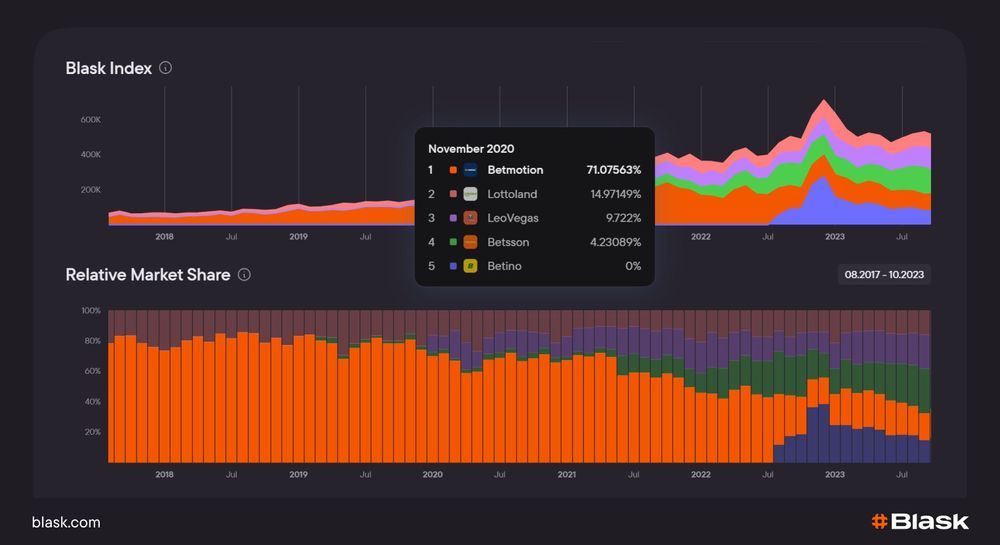
Adapting games for diverse markets.
iGaming providers also face the challenge of adapting their games for different cultural and regulatory environments. Players in different regions have varied preferences, and games that perform well in one market might not resonate in another. Additionally, regulatory requirements often necessitate changes to game features, such as incorporating mandatory player breaks or other responsible gaming features, which can delay market entry and increase costs. This need for localization and adaptation means that providers must be agile and responsive, ready to tweak and tailor their offerings to meet the unique demands of each market.
Based on the Blask Customer Profile analytics shown in the images below, we can see clear differences in player preferences between India and Brazil:
- In India, Poker or Rummy is the most popular product, used by 50% of players, followed closely by traditional sports betting at 70%.
- Esports are less popular, with only 15% engagement.
- In contrast, Brazil shows a higher interest in Esports at 40%, while traditional sports betting remains the top choice at 70%.
- Lottery is also more popular in Brazil at 50%, compared to 40% in India.
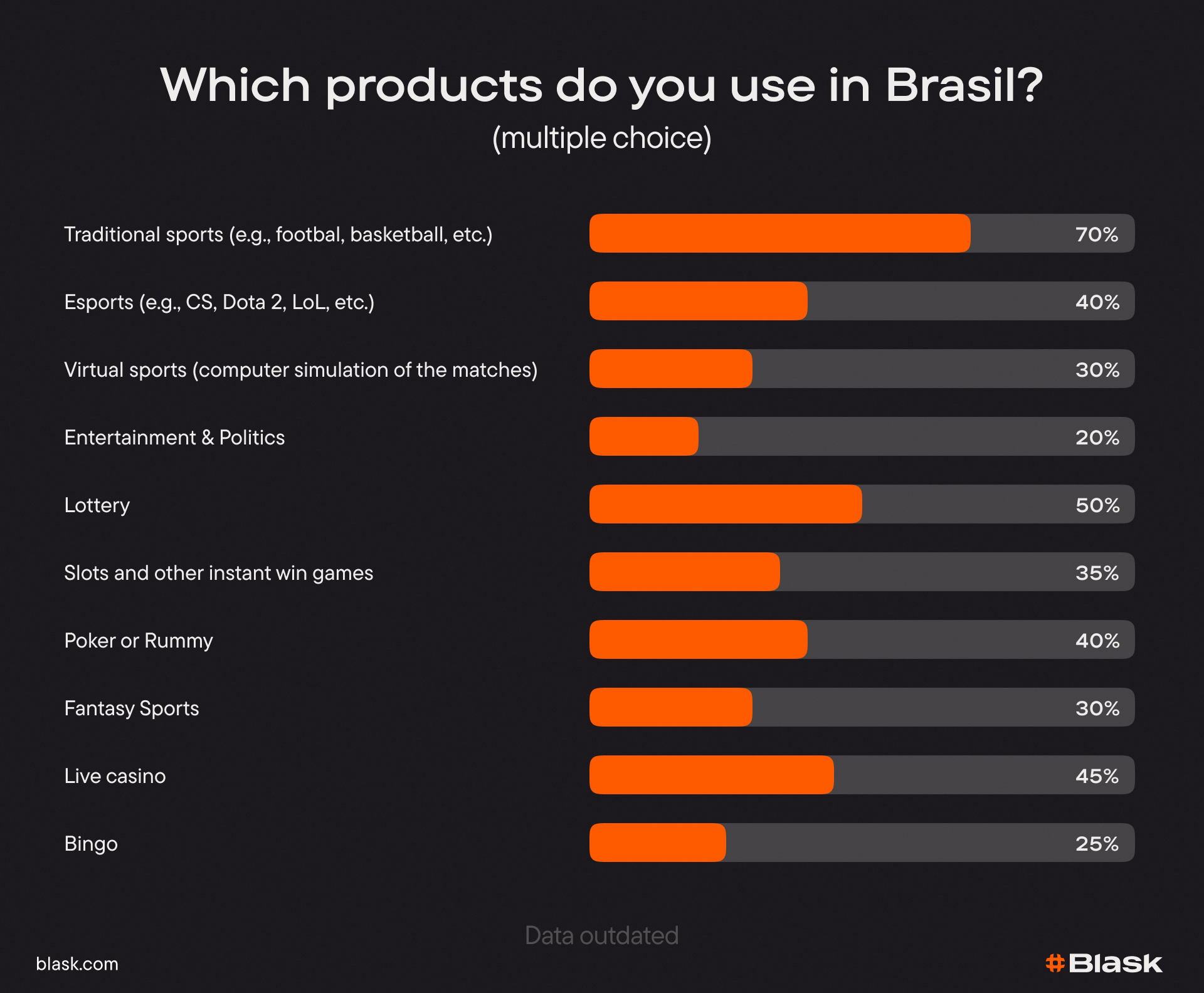
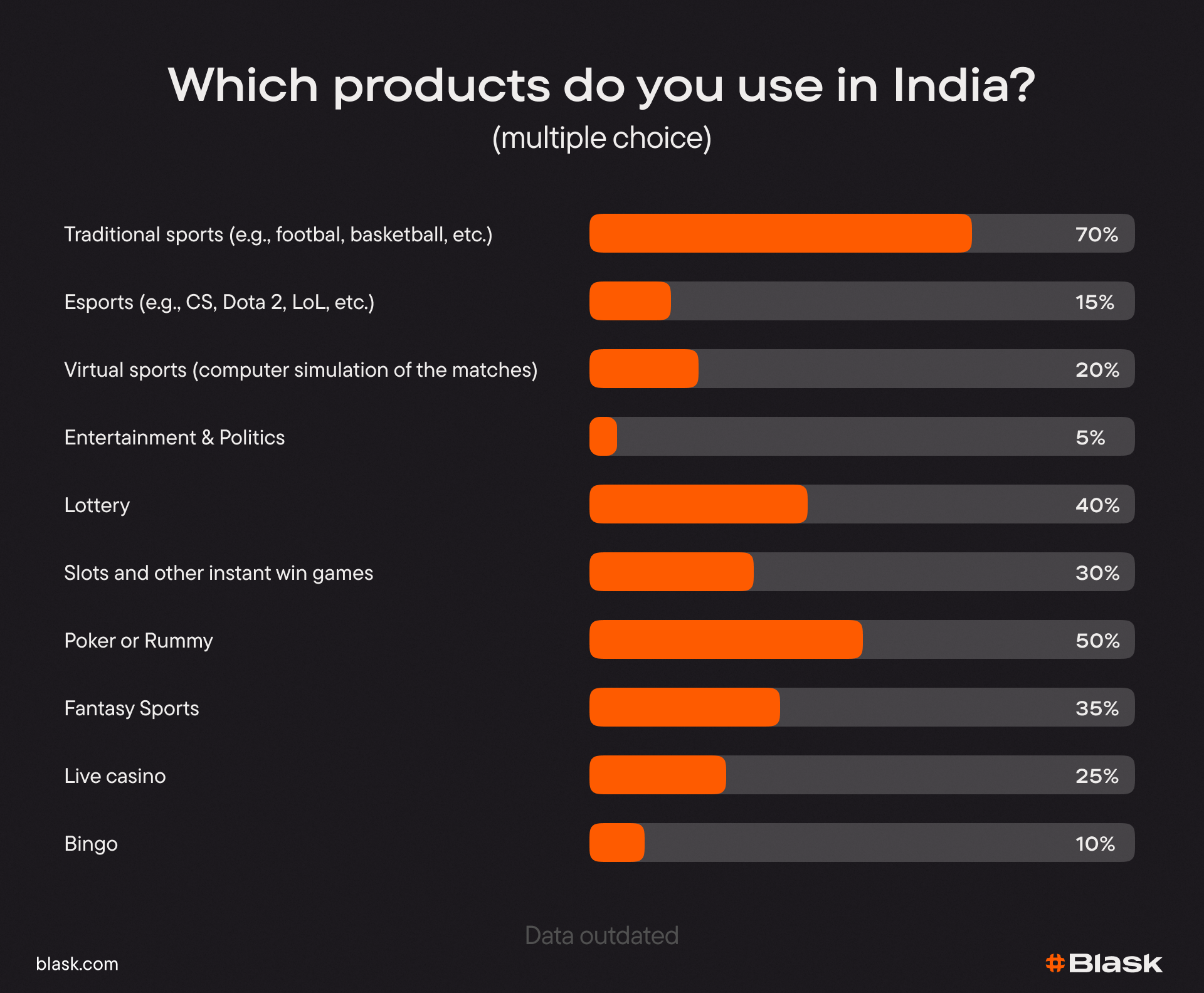
Blask Customer Profile for Brazil and India
Talent acquisition and retention.
The demand for skilled professionals in the iGaming industry is higher than ever, with many companies struggling to attract and retain top talent. This challenge is compounded by the industry’s intense competition, which requires companies to offer attractive compensation packages and work environments. Moreover, there is a lingering stigma associated with the gambling industry in some regions, making it harder to recruit professionals who might otherwise be hesitant to join the sector. In such a high-pressure environment, the ability to build and maintain a talented team is crucial for sustaining growth and innovation.
Emphasis on responsible gaming.
With increasing scrutiny from regulators and the public, iGaming companies must invest heavily in responsible gaming initiatives. The industry has faced significant fines in recent years due to failures in protecting players, highlighting the importance of implementing robust responsible gaming policies. Operators are now more focused than ever on offering self-exclusion options, educating players about the risks of gaming, and ensuring that their platforms promote safe and responsible behavior. In an industry where reputation is everything, a strong commitment to responsible gaming is not just good ethics—it’s good business.
These challenges illustrate the complex environment in which iGaming operators must navigate to stay competitive. Success in this industry requires not only innovation and rapid adaptation but also a deep understanding of the regulatory landscape and a commitment to responsible gaming. By addressing these challenges head-on and leveraging advanced tools like AI, iGaming companies can better position themselves to thrive in this fast-paced and dynamic market.
Overview of key iGaming markets.
The iGaming industry is truly global, with different regions offering unique opportunities and challenges. Understanding the characteristics of each market is essential for strategic decision-making.
Below is a brief overview of some of the most significant iGaming markets around the world:
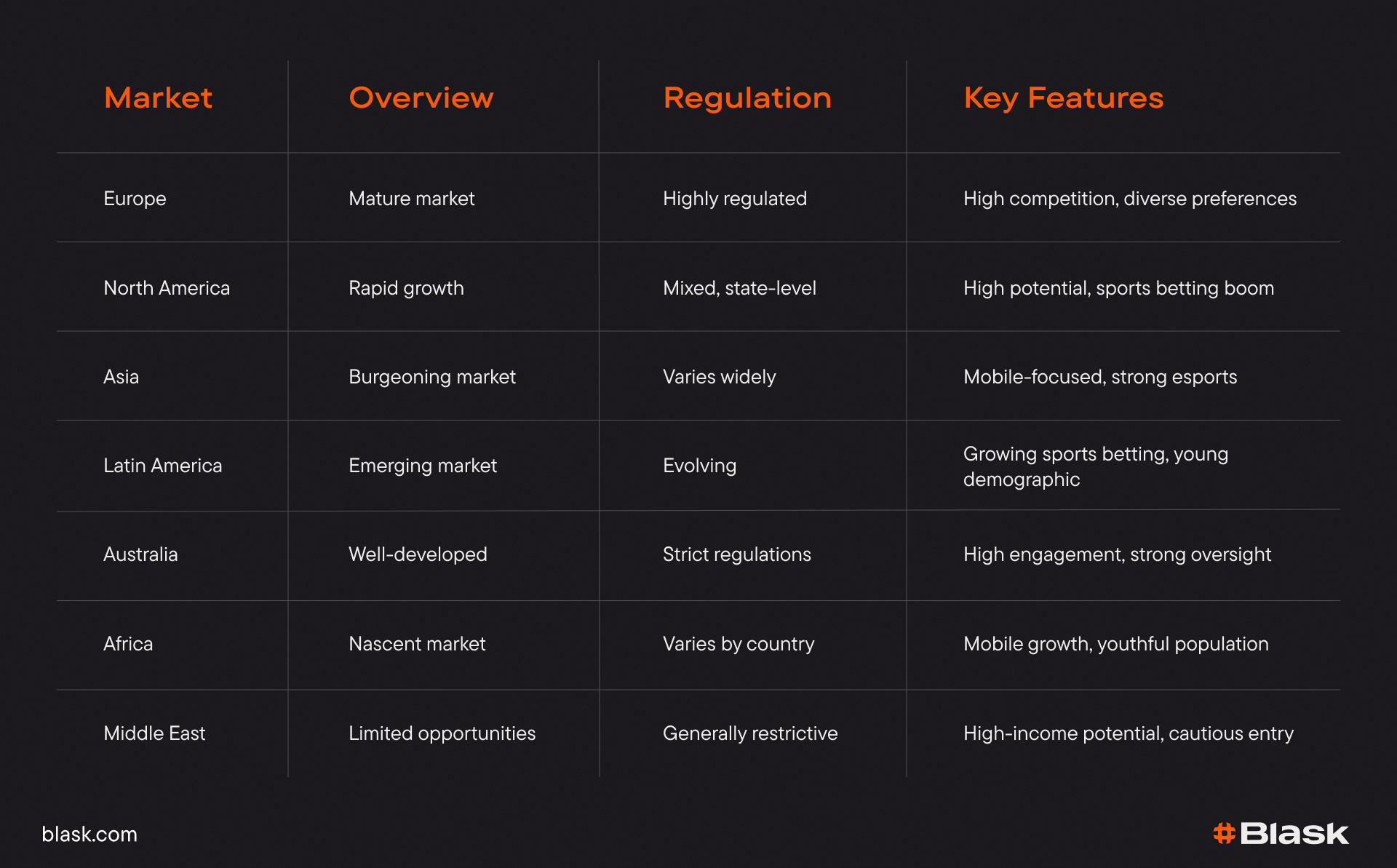
Understanding iGaming market dynamics.
Before we can talk about how AI simplifies market comparisons, let’s get a grip on the key metrics that drive iGaming market analysis.
Key metrics for iGaming market analysis.
To start with, Gross Gaming Revenue (GGR) is one of the most critical metrics. GGR represents the total amount of money players wager, minus the payouts. Essentially, it’s the revenue that remains with the operators. Keeping an eye on GGR across different markets helps you understand where the money is flowing—and where it’s not.
Then, we have First-Time Deposits (FTDs). This metric tracks the number of players making their first deposit on a platform. High FTD numbers can indicate strong acquisition strategies or the effectiveness of a marketing campaign.
Of course, you can’t ignore Market Share. This metric shows you how much of the pie you control compared to your competitors. It’s essential for understanding your relative position in the market and identifying opportunities for growth.
Finally, metrics like Year-over-Year (YoY) and Month-over-Month (MoM) growth provide a deeper understanding of your performance over time. These metrics help you track progress and spot trends early.
The complexity of global market comparisons.
Comparing markets isn't as simple as lining up the numbers. Each market operates under different regulations, cultural nuances, and levels of maturity. For instance, a booming market in Europe might be playing by a different rulebook than one in Asia. These differences make it challenging to draw direct comparisons. However, AI tools can bridge this gap by standardizing data and providing a more accurate picture across diverse markets.In Europe, the UK Gambling Commission recently introduced stricter regulations on online slot games, including a ban on auto-play features and spin speeds faster than 2.5 seconds. This move has significantly impacted game design and player engagement strategies in the UK market.
Meanwhile, in the United States, the landscape continues to evolve rapidly with more states legalizing online gambling. For example, Ohio launched its regulated online sports betting market in January 2023, joining a growing list of states embracing iGaming.
In contrast, Asian markets like Japan are taking a more cautious approach. The country is still in the process of developing its regulatory framework for integrated resorts, which will include casino gambling, highlighting the varying pace of market development across regions.
How AI simplifies market comparison.
Now that we’ve covered the basics, let’s talk about how AI steps in to make your life easier.
Automated data collection and analysis.
First things first: data. The iGaming industry is awash with it, and collecting data from multiple sources manually can be like trying to catch a waterfall in a teacup. AI tools, however, excel at automating this process. And here’s the best part: AI doesn’t just collect data; it analyzes it too.
By processing vast amounts of data in real-time, AI identifies patterns, highlights anomalies, and presents actionable insights—all without you lifting a finger. It’s like having a super-smart assistant who works 24/7 and never gets tired.
For instance, Blask leverages AI models to gather data on all brands in the market and analyze Market Volume for individual countries. This approach allows for a comprehensive view of market dynamics, answering crucial questions like: is the iGaming market in Brazil or Bangladesh growing? How many people in these countries are interested in iGaming? What's the capacity of these markets in terms of estimated First-Time Deposits (eFTD) and estimated Gross Gaming Revenue (eGGR)?
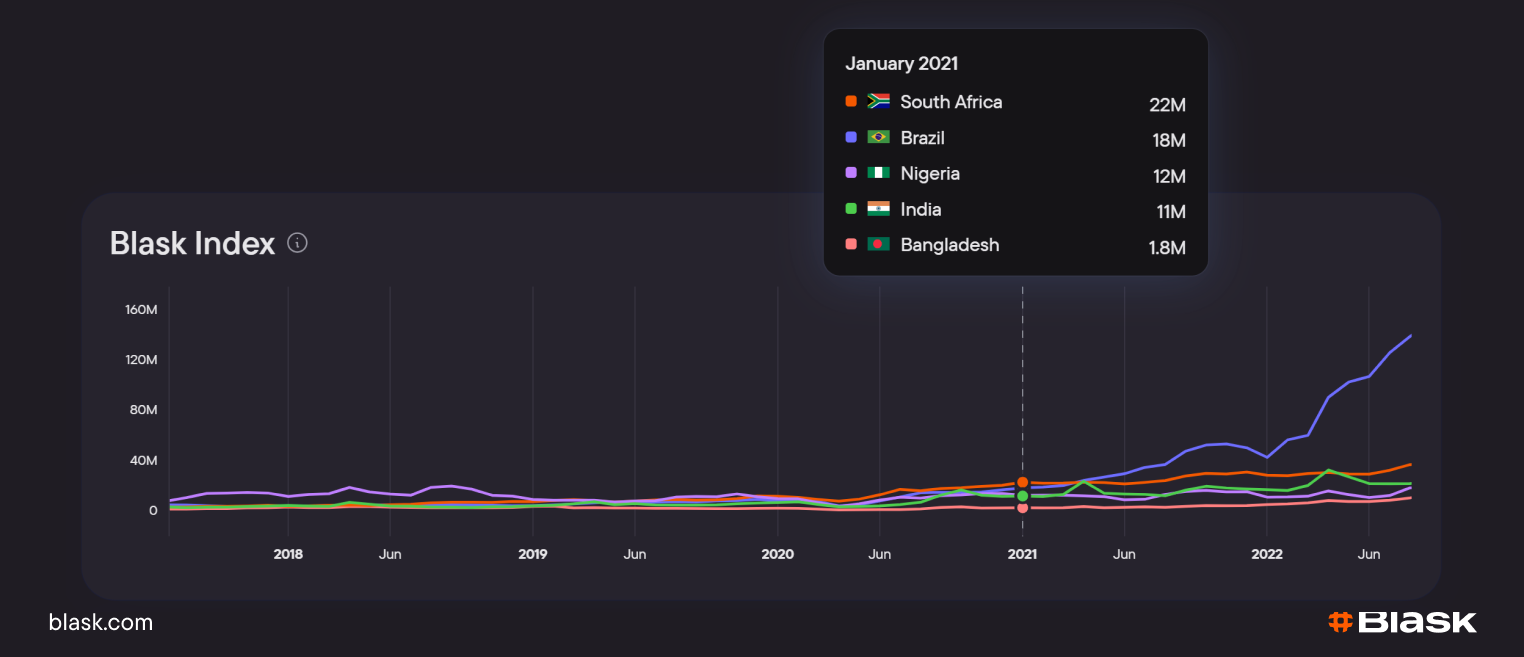
Predictive analytics for market trends.
But AI doesn't stop at just analyzing the present. It's also a crystal ball for predicting the future. Predictive analytics, powered by AI, can forecast market trends and shifts before they become apparent to the naked eye. This capability allows you to anticipate changes in player behavior, identify emerging markets, and even spot potential threats from new competitors.
Blask takes this a step further by enabling operators to identify and track their nearest competitors with precision. The platform's AI-driven algorithms analyze Relative market share, brand positioning, and engagement metrics to pinpoint direct rivals. This feature allows companies to monitor competitors closely, tracking their market performance, promotional strategies, and growth trajectories in real-time.
A striking example of the power of such analytics is the case of Stake during the 2024 Indian Premier League (IPL). Blask's analysis revealed Stake's meteoric rise from 4th to 1st position in the Indian market, capturing a staggering 47.69% increase in relative market share. This surge was accompanied by an impressive 362% month-over-month growth, outpacing established giants like Parimatch and Dafabet. Stake's performance during the IPL demonstrates how quickly market dynamics can shift and underscores the importance of real-time competitor tracking in the fast-paced iGaming industry.
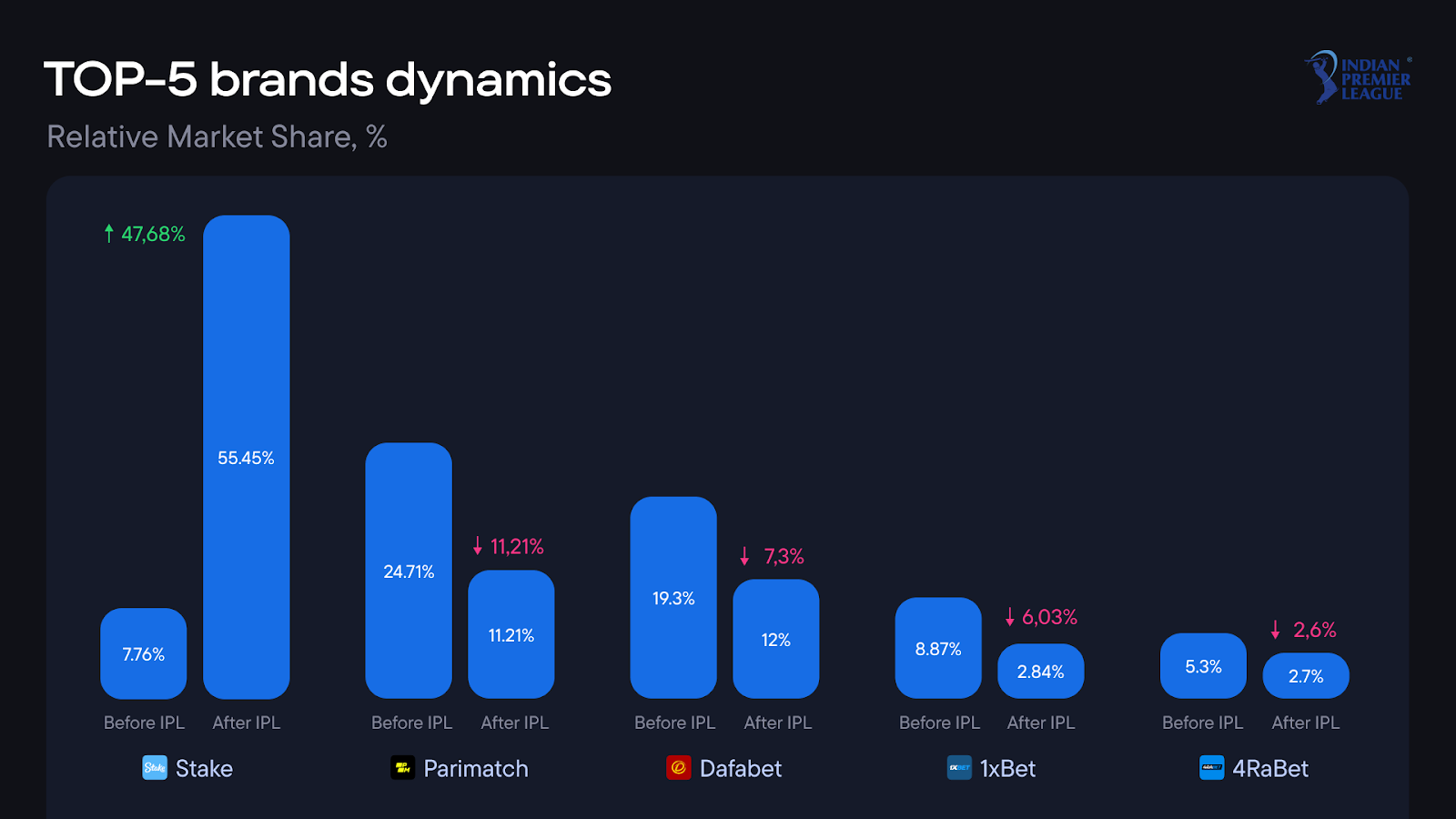
By leveraging such insights, operators can make data-driven decisions, adjust their strategies proactively, and stay ahead in an increasingly competitive landscape. Whether it's identifying emerging threats or capitalizing on market opportunities, AI-powered predictive analytics are becoming indispensable tools for success in the iGaming sector.
Blask tools at work: making market comparison effortless!
Now, let’s talk specifics. Blask offers a suite of tools designed to make comparing iGaming markets not just easy, but downright enjoyable (okay, maybe that's a stretch, but you get the idea).
Blask Index.
At the heart of Blask’s offerings is the Blask Index. This metric aggregates market sentiment into a single, easy-to-understand score. Think of it as a snapshot of how the market feels at any given moment. Whether you’re looking at a specific region or comparing global markets, Blask Index gives you an instant overview.
For example, if you’re trying to decide whether to enter a new market, Blask Index can quickly tell you whether the timing is right. It’s like having a market sentiment compass that always points you in the right direction.

In-depth competitor analysis.
Of course, understanding the market is only half the battle. To truly stay ahead, you need to know what your competitors are up to. Blask’s AI tools provide detailed insights into your competitors’ strategies, market share, and growth patterns.
Want to know why a competitor is suddenly gaining ground in a particular market? Blask can tell you. Curious about which marketing strategies are driving the most first-time deposits for your rivals? Blask has you covered. This level of insight allows you to not only react to competitor moves but also anticipate them.
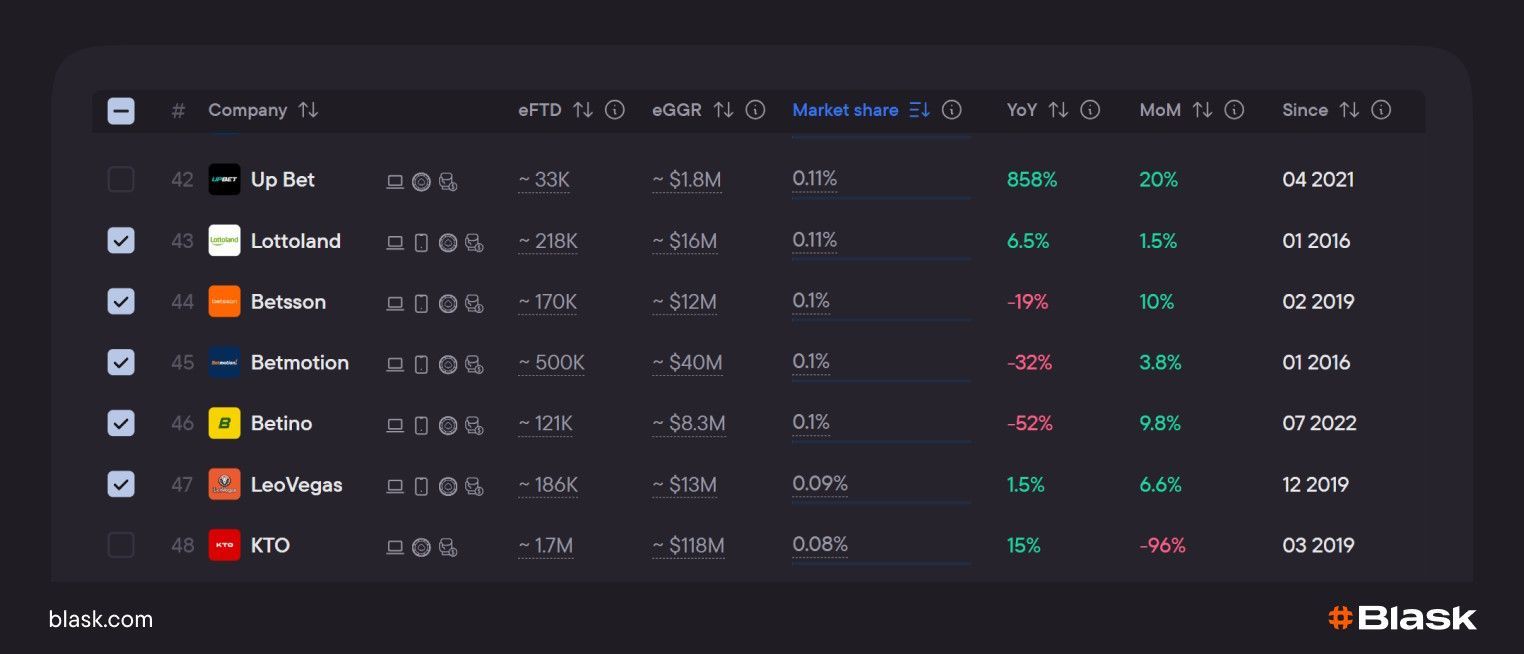
The power of AI in iGaming: case studies and real life examples.
AI's role in iGaming is multifaceted, impacting everything from player retention to personalized gaming experiences. Let’s explore some of the critical ways AI is making a difference:
1. Overcoming pain points in market analysis.
Market analysis can be overwhelming, especially with the sheer volume of data available. AI-driven tools are designed to cut through the noise and present the most relevant insights clearly and concisely. For instance, using advanced time-series forecast models, operators can predict future trends based on historical data, optimizing operations and enhancing profitability.
A leading iGaming operator utilized AI to reduce their market analysis time by 40%, leading to a 25% increase in market responsiveness.
2. Personalizing player experiences.
AI is revolutionizing how iGaming platforms personalize player experiences. By analyzing individual player behaviors and preferences, AI models tailor content and promotions to each user, significantly enhancing engagement and retention.
GR8 Tech implemented AI-driven recommendation systems that adapted in real-time to player preferences, boosting engagement by 30% and increasing overall player satisfaction. Additionally, AI-powered CRM systems allowed platforms to deliver highly targeted promotions, resulting in a 20% increase in player retention.
3. Advanced gamification and behavioral prediction.
Gamification has long been a powerful tool in iGaming, and AI takes it to the next level. With models like binary classification and multi-class classification, AI can predict player behaviors, such as the likelihood of churn or the potential success of promotional campaigns. These insights allow operators to craft personalized strategies that resonate with players and drive engagement.
Xtremepush's InfinityAI platform uses adaptive AI models to predict player behavior, helping operators prevent churn, identify high-value players, and optimize campaign strategies in real-time.
4. Driving strategic decision-making.
AI doesn't just provide data—it offers actionable insights that drive strategic decisions. From forecasting player lifetime value (LTV) to optimizing customer acquisition strategies, AI tools enable operators to allocate resources more effectively and make decisions that enhance long-term profitability.
An iGaming operator using InfinityAI's LTV prediction model was able to tailor their loyalty programs to high-value players, resulting in a significant increase in customer retention and overall revenue.
Stay ahead with AI-powered market insights with Blask!
In the ever-evolving world of iGaming, staying competitive requires more than just hard work—it requires smart work. AI tools like those offered by Blask make it easier than ever to compare markets, track competitors, and predict trends. By leveraging these tools, you can not only keep up with the competition but leave them in the dust.
Ready to take your iGaming strategy to the next level? Dive into the world of AI-powered market insights with Blask and see the difference it can make. Because in this race, the best way to win is to think ahead—and that’s exactly what AI helps you do.
